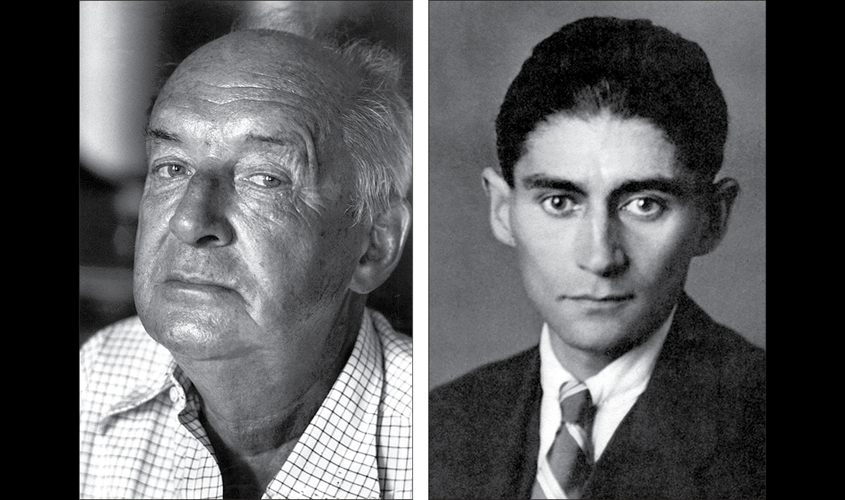Literary testaments, as a unified genre, bring to mind the kind of tragedy in which the protagonist is consumed by a crippling sense of shame and self-doubt. No writer ever wished for a posthumous fete in their name, nor ever said they wanted a statue built in their likeness in the market square. Issued from the deathbed, a writer’s eleventh-hour decree invariably constitutes a grim appeal for expunging the available records of his or her creative failures. The two great examples, set centuries apart—of Virgil and Kafka, both of whom wanted their manuscripts destroyed after their death—convey to us something of the universal nature of this tendency.
The latest in this line of late tragic heroes is the British novelist Terry Pratchett. Before his death in March 2015, Pratchett had expressed the wish that his unfinished novels be destroyed. But his instructions to the Pratchett estate were more precise than that. He wanted his computer hard drive, containing the digital manuscripts of a few unfinished books, to “be put in the middle of the road” and “a steamroller to steamroll over them all”.
According to newspaper reports, the stunt, posthumously stage-managed by the author, was enacted earlier this week at a public fair in Dorset. And the crumpled remains of the hard drive will now be put on display at an upcoming exhibition dedicated to Pratchett and his work at the Salisbury Museum.
Apart from the post-industrial symbolism of this event—which wouldn’t have been out of place in Pratchett’s sci-fi universe—what strikes me as odd here is how a thing destroyed, the hard drive, is instantly transformed into a thing preserved, a haloed museum piece. It becomes a monument of sorts—strange, sterile and lifeless—celebrating not authorial achievement but failure. The kind of tribute no writer would really wish for.
Imagine the ashes of Kafka’s manuscripts preserved in a Grecian urn somewhere. What if Kafka’s friend and literary executor Max Brod were to do this? But of course, Brod wouldn’t have done such a thing in a million years. Kafka’s final instructions, invoking a bonfire of his writings, were conveyed to Brod through a letter. But many years before that, Kafka had spelled out to the same to Brod in person. “My last testament,” said the author of The Trial, “will be very simple: a request that you burn everything.” We also have Brod’s response to this unholy edict, mentioned in his postscript to The Trial: “I can still remember the exact wording of the answer I gave him…‘I’m telling you right now that I won’t carry out your wishes.’”
Brod was the man who defied Kafka, as well as the one who saved Kafka for posterity. Depending on where you stand on this debate, Brod can be perceived as either backbiting Brutus or selfless saviour. Take your pick.
Milan Kundera, in his great book Testaments Betrayed, quotes this exchange between Kafka and Brod, and offers his own solution to the literary estate’s version of the classic Shakespearean dilemma, “to burn or not to burn”.
“To me,” Kundera writes, “Brod’s indiscretion is inexcusable. He betrayed his friend. He acted against his friend’s wishes, against the meaning and the spirit of his wishes, against the sense of shame he knew in the man.”
If Kafka wanted a section of his work destroyed (this included some unfinished novels, and his diaries and letters), he was doing so first, out of embarrassment, to protect his past from prying eyes; and second, Kundera argues, as a creative response to substandard writing. That’s what writers do when they’re confronted with a bunch of dead words on the page: they press the delete button, they throw stuff away. To deny any author, living or dead, this basic right is nothing less than cruel. More, Kundera even draws a moral equivalence between censorship and—its obverse—publishing a work against its author’s wishes.
Brod’s defenders often say that if Kafka wanted his work destroyed, he would have done so himself. Vladimir Nabokov, for example, was of this view.
On the other hand, Brod’s defenders often say that if Kafka wanted his work destroyed, he would have done so himself. Vladimir Nabokov, for example, was of this view.
But how’s this for a touch of Nabokovian irony: Nabokov himself wanted his last, unfinished novel destroyed, entrusting his wife, Vera, with the job. Later, with Vera failing to bring herself to commit the ghastly act, it was Nabokov’s son, Dmitry’s turn to inherit the problem.
For years, the manuscript of Nabokov’s last novel—comprising 138 handwritten index cards—was placed, absurdly, under lock and key in a Swiss bank vault. (What would Marxist theory make of a work of high literature inside a high-security vault?)
The unpublished novel, and its uncertain fate, soon became the subject of an international literary debate on whether Nabokov’s last testament should be obeyed, with figures such as John Banville (against the motion) and Tom Stoppard (for it) weighing in. When at last, in April 2008, Dmitry threw in the towel and decided to do his father the kind of favour Brod had done Kafka. The Original of Laura, as the novel is called, was finally published in November 2009, leaving critics and even Nabokov fanboys a little underwhelmed. One prominent reviewer called it “a posthumous collection of rough drafts and authorial notes, more novelty than anything else”.
Perhaps it would have been for the best had Dmitry burned the book. And maybe the author had a point in wanting it burned to begin with. “Let us fold the wings of our visions,” goes a Nabokov poem. “It’s night.” Every artist reaches the point when an inner voice starts urging them to pack up and go home, reminding them that it’s night. It takes a special kind of gift to accept this fate, and a special kind of courage to do so on the deathbed. As Nabokov and Kafka and Virgil had done. Those great tragic heroes.

